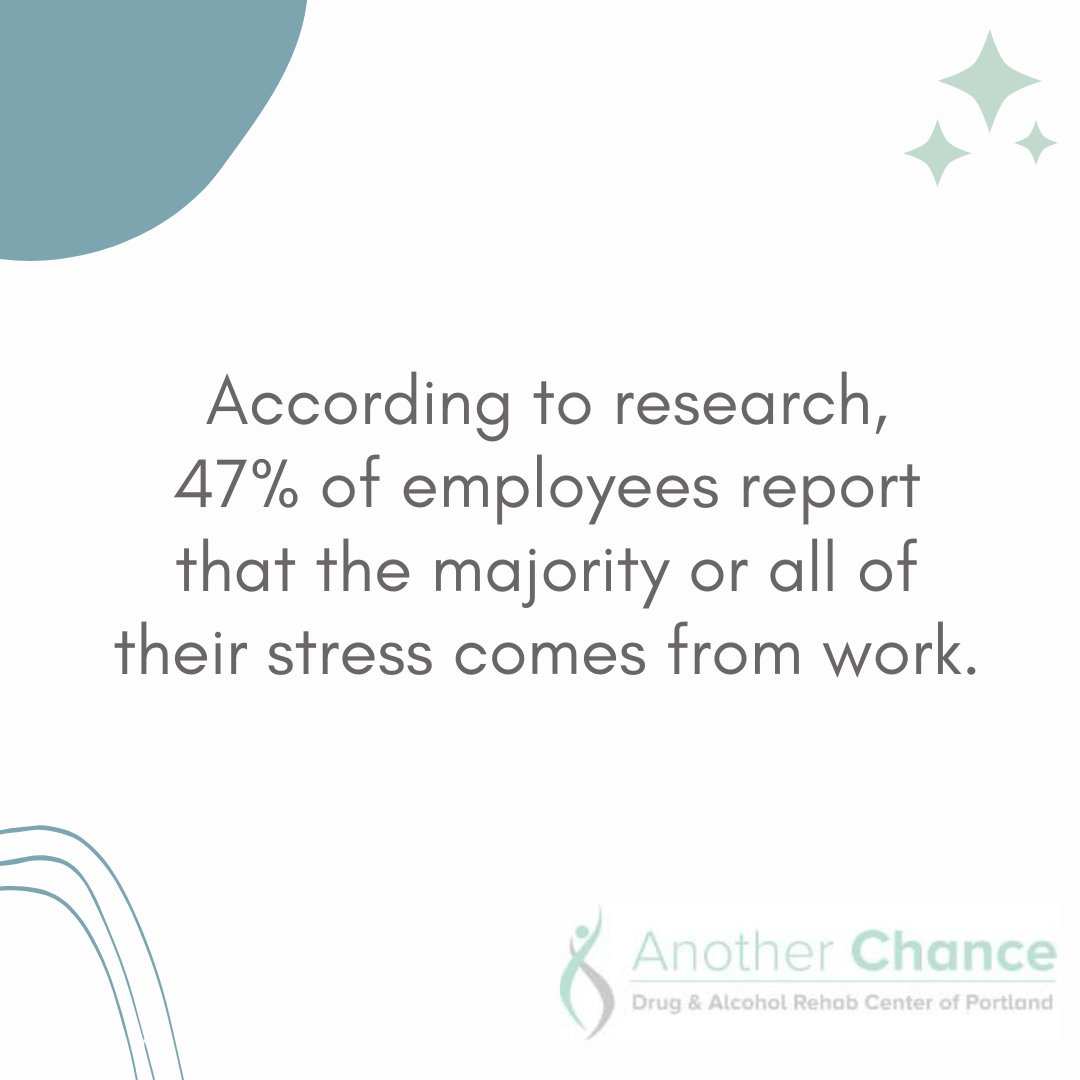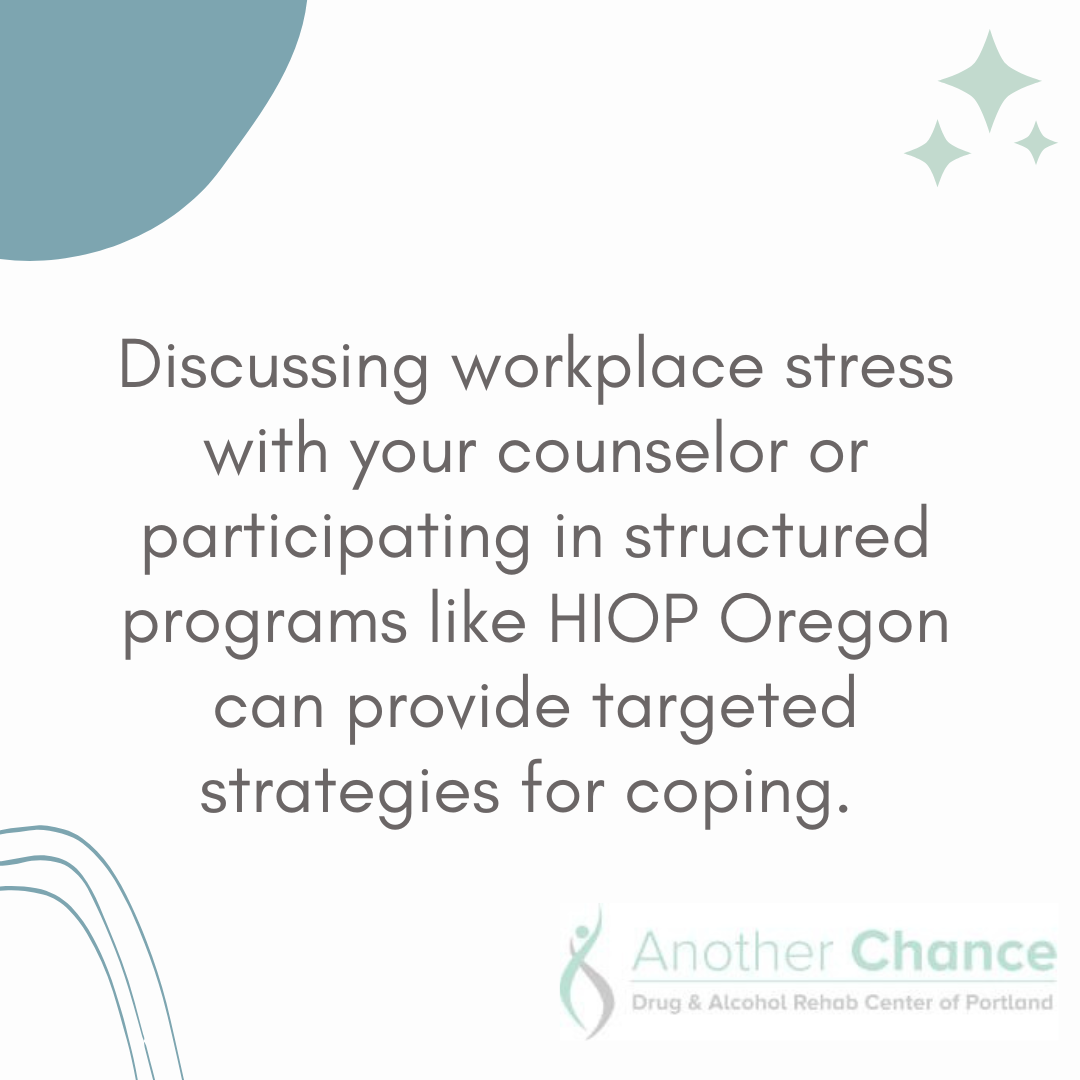November 21, 2025
Learn how workplace stress can affect recovery and learn ways to manage both effectively. Explore support through Portland addiction treatment programs.
Workplace stress doesn’t just drain your energy. If you’re overcoming addiction, it can actively challenge your recovery. Balancing deadlines, long hours, and high-pressure responsibilities can increase cravings, trigger old habits, or create moments of vulnerability in your sobriety.
Programs like Portland addiction treatment highlight how stress can interfere with recovery and provide strategies to help you navigate these challenges effectively.
In this article, you’ll explore how workplace stress impacts your recovery journey, recognize the signs that it may be affecting your progress, and learn practical strategies to manage pressure while maintaining long-term sobriety.

Workplace stress is the physical and emotional strain that arises from your job demands and environment. Common causes include high workloads, long hours, job insecurity, and toxic or unsupportive work environments.
According to research, 47% of employees report that the majority or all of their stress comes from work, highlighting just how pervasive this issue can be.
Chronic stress affects more than just your mood or energy. In fact, it can increase the risk of turning to substances as a coping mechanism, even if you’re already in recovery. Ongoing stress can also exacerbate pre-existing mental health conditions, making it harder to manage cravings, maintain routines, and stay resilient in your sobriety.
When workplace stress builds up, it can push you toward coping mechanisms that feel immediate but harmful. Turning to alcohol, prescription medications, or other substances to manage stress may seem like a quick fix, but it can quickly interfere with your recovery. Even small slips can escalate if stress continues unchecked, increasing the risk of relapse.
Accessing professional Portland addiction treatment can provide guidance and tools to manage stress and protect your sobriety. For individuals in recovery, high-pressure work environments can trigger cravings, disrupt routines, and make it harder to apply the skills learned in rehab. Options like a high-intensity outpatient program (HIOP Portland) offer therapy, peer support, and relapse prevention strategies to help you stay on track.
Research shows that chronic workplace stress is linked to higher rates of substance misuse and relapse, highlighting why managing stress is a critical part of maintaining long-term recovery.

Even if you’re committed to sobriety, workplace stress can quietly interfere with your progress. Recognizing the warning signs early allows you to take action before stress leads to relapse. Enrolling in outpatient drug and alcohol treatment programs can provide strategies and support to address these challenges effectively.
Stress can trigger urges to use substances, even for those who have been sober for some time. Pay attention to moments when you feel tempted to cope with work pressure through alcohol, prescription drugs, or other substances.
Difficulty falling asleep, feeling constantly on edge, or snapping at colleagues and loved ones are common indicators that stress is affecting your recovery. Chronic anxiety or restless nights can also undermine your ability to focus on healthy routines, making relapse more likely.
Stress can make it harder to prioritize your recovery alongside your job and personal life. Strained relationships and missed responsibilities can be early warning signs. When work consistently intrudes on personal time, it can create tension with friends and family who support your sobriety.
Struggling to concentrate, complete tasks, or stay organized can reflect the toll workplace stress is taking on both your professional and recovery life. Over time, decreased productivity can increase frustration and stress, further threatening your progress.

Managing workplace stress is essential to maintaining your recovery. Incorporating practical strategies into your daily routine can help you stay resilient and protect your sobriety. Professionals at Portland addiction treatment centers can give you proper guidance and support as you combat both stress and addiction.
Sleep, nutrition, exercise, and mindfulness are foundational to managing stress and supporting recovery. Practicing these habits consistently helps you maintain emotional balance and strengthens the life skills you need to navigate challenging situations at work. Regular self-care also improves your focus and energy, making it easier to respond to stress without turning to old habits.
Learning to manage your workload, communicate your needs, and take regular breaks is critical. Setting clear boundaries prevents burnout, reduces stress, and creates space for recovery-focused routines. Establishing limits at work reinforces your commitment to sobriety and ensures you have time to recharge mentally and physically.
Connecting with peers, supervisors, or counselors who understand your journey can help you manage stress before it escalates. Leaning on a reliable support network provides encouragement, accountability, and perspective during high-pressure moments. Engaging with supportive people also gives you practical advice for handling work-related triggers in real time.
Discussing workplace stress with your counselor or participating in structured programs like HIOP Oregon can provide targeted strategies for coping. Outpatient counseling and stress management programs offer tools to handle triggers, maintain focus, and reinforce healthy habits in your daily life. Sharing your challenges with professionals ensures you receive tailored guidance that fits your unique recovery needs.
Participating in outpatient drug and alcohol treatment gives you the flexibility to keep up with your professional responsibilities while still receiving the guidance and structure needed to stay on track in recovery. These programs recognize that workplace stress doesn’t just disappear once you enter sobriety — it often becomes one of the biggest tests of it.
Through tailored sessions offered by HIOP Portland and HIOP Oregon, you learn how to identify the specific triggers that arise in work environments, manage them in real time, and use healthy coping mechanisms instead of old habits.
Beyond traditional therapy, outpatient treatment includes group sessions and life skills training that help you build resilience and strengthen your ability to handle stress. These programs emphasize collaboration, allowing you to share experiences with others who understand the balance between maintaining a job and recovery. Over time, you develop tools for communication, time management, and emotional regulation. And all these are essential for reducing burnout and preventing relapse.
Most importantly, outpatient programs provide ongoing support long after your initial treatment phase, ensuring you have a network that helps you maintain stability and confidence in both your career and your sobriety.

Workplace stress can sneak up on you, especially when you’re working hard to protect your recovery. It can drain your energy, cloud your focus, and make old habits feel tempting again.
The good news is that with the right strategies and the right support, you can manage both stress and sobriety with confidence. Programs like Portland addiction treatment are designed to help you stay balanced, no matter how demanding life gets.
If the pressure from work is starting to feel like too much, remember that help is within reach. Another Chance provides compassionate care, practical tools, and ongoing support to help you stay grounded and continue building a healthy, sustainable future in recovery.

Reviewer
Henna is a content strategist with over 5 years of experience in behavioral health marketing. She specializes in creating informed, compassionate content for addiction treatment centers, using her deep understanding of the industry to educate, engage, and support individuals seeking recovery.